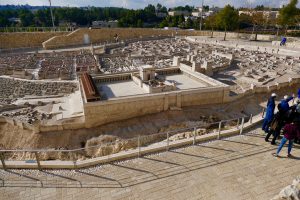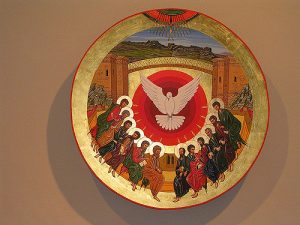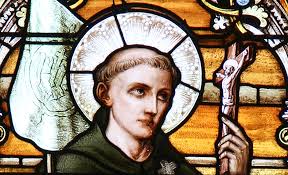Temples of a Living God: St John of Capistrano
(Eph 2:12-22; Ps 85; Lk 12:35-38)
***************************************************
The late Serge LeClerc was a motivational speaker who gave a keynote presentation at a Catholic Health Conference in Saskatoon years ago. He was born in Winnipeg of a single Indigenous addicted mother considered unfit by the Social Services System of raising a child, so he was taken away from her and put into foster care. After a series of abusive situations, he rebelled, became a delinquent and turned to crime, eventually running his own gang that got into drugs, prostitution, extortion – anything that would make them money and give them power. Throughout his talk he mentioned he was desperately searching for identity, and discovered he could manipulate even prominent business people because they were also looking for identity. Eventually caught, charged, tried and incarcerated, he had a conversion experience in prison, gave his life to Christ, became a model prisoner, and upon his release, a motivational speaker striving to help other young people not take the destructive path he had been on.

Serge LeClerc
His experience touches on our identity in Christ and the dignity we have as holy temples and spiritual dwelling places for God.
In the first reading, St. Paul goes to great pains to communicate to the Ephesians the grandeur of their new-found identity and dignity in Christ. Formerly aliens and strangers to God, their faith in Christ now places them into one new humanity, citizens with the saints, members of the household of God, connected to the apostles, and above all, a holy temple in the Lord and a spiritual dwelling place for God. They have every reason to rejoice in their exalted identity and the dignity that identity entails.
The Old Testament provides a significant background to this identity as a holy temple and dwelling place of God. The temple in Jerusalem was considered to be where God dwelt among God’s people. At the dedication of this temple, the glory or shekinah of God was so strong the priests could hardly enter. However, during the time of Ezekiel, the temple sacrificial religion had become so corrupt the shekinah, or glory of God, rose up, abandoned the temple and headed to the East. Then came the exile and destruction of Solomon’s grandiose temple.

Temple Mount Jerusalem
After the exile and permission to return to their homeland, the second temple was built and dedicated. However, the glory of God did not return to the temple, and this always bothered the Jewish religious leaders. A result of this lack was the rise of the Pharisees, who sought to keep the law so perfectly they reasoned the glory of God would return to the temple. That of course, risks becoming the heresy of Pelagianism, or trying to earn God’s love.
One of the roles Jesus had as the Messiah was to restore the temple. We read in John how he cleansed the temple, and referred to his own body as the temple to be raised up after three days. He was beginning the restoration of the temple. That was complete when the glory of God did return, not to the physical temple in Jerusalem, but to the small band of believers in Jesus huddled in the upper room. In the form of a strong wind that shook the building and flames of fire, the shekinah or glory of God, the Holy Spirit descending upon each person there and transformed them into the new temple of God through the indwelling of the Spirit of the Risen Lord.

That small band of believers was transformed into the Church, the Body of Christ, temples of the Holy Spirit, charged with continuing the mission of Jesus to communicate the depth of God’s love to the world. These are our ancestors in the faith, the foundation of apostles upon which the church of Ephesus was built, and upon which we now stand as the new temple and dwelling place of God. That is our identity and our dignity, and we are called to live it out.
In the gospel, Jesus instructs us how we can do just that – we are to be attentive to the Spirit, alert, dressed for action, waiting expectantly for Jesus to come again. I believe this means we are to put our complete faith and trust in Jesus, ponder his words through the scriptures, deepen our intimate relationship with him through moments of contemplative prayer, and above all, seek to love one another as he has loved us, and to love even our enemies by forgiving them from the heart, as he has instructed us.
The Church today remembers St. John of Capistrano, whose life in a way resonates with that of LeClerc. Born at Capistrano in the Kingdom of Naples in 1386, John trained as a lawyer at the University of Perugia and became governor of that city in 1412. Imprisonment, however, prompted him to change his life. When Perugia became involved in a conflict, John was imprisoned, leading him to a period of reflection. At age 30 he joined the Friars Minor and was ordained to the priesthood. For the next 30 years he preached missions in Italy, drawing large, enthusiastic crowds. Meanwhile, he assisted Bernadine of Sienna in re-uniting the divided Franciscans. John was frequently sent on papal diplomatic missions. While his preaching revived the faith of many, some of his methods in dealing with heretics were unfortunately harsh. In 1453 he was called to Hungary to preach a crusade against the Turks threatening to take Vienna and Rome. At the age of 70, carrying a cross rather than a sword, John led a wing of the Christian army in the Battle of Belgrade. The victory in 1456 prevented the Turks from overrunning Europe. A few months later John died of the plague. He is a patron of military chaplains.

St John of Capistrano
The Eucharist is actually based on our Jewish heritage. Our synagogue is the Liturgy of the Word, in which we attentively listen to and break open the Word of God. Our temple worship is the Liturgy of the Eucharist, only instead of animal sacrifice we offer to God the greatest sacrifice of all, the very body and blood of Jesus broken and shed upon the cross.
May our celebration deepen our identity and dignity as temples of the Holy Spirit and dwelling places of God, and empower us to share our faith and reason for hope to all we meet, as did our ancestors in the upper room.




We should dwell in places like the temple of God and even ponder the scriptures that explains his teachings . We should receive the word of God and the Holy Spirit to strengthen our faith and intimate relationship with God. We can only do that if we truly believe in God and Jesus Christ . We decide to follow his ways of teachings and living out his word. So, we are to ask God to forgive our sins and past mistakes we have committed. We are to repent and change our behavior and become this new person and walk this new path. This is a chance to receive the Holy Spirit and dwell in the temple of the Holy Spirit. We are to love one another like loving ourselves and loving our enemies. This is what Jesus taught us after his death and resurrection by using his pain and sufferings as an example. Lastly, we are to do the same by following his example of compassion, unconditional love and forgiveness. This is part of the commandments that God stated with Jesus Christ and Moses. Amen. Many Blessings!
Thanks for the following homily about living in the temples of the Holy Spirit. This is the word of God. Bishop Lavoie. Gracias!
The temple is the house of God. It should be a place to praise and worship God. It is not a market to sell food , play around and gamble so Jesus Christ cleans out lepers, cast out demons and rebuild the temple. This happen after his death and resurrection and after 3 days he will come back to rebuild the temple. When we enter the chapel we suppose to bow or kneel in front of the altar before taking a seat. Jesus is present inside the Tabernacle. I keep on remembering this in my mind. Keep it up! God Bless!